 Last week, at the behest of the "terrorist-enabling" National Rifle Association (NRA), the Republican-controlled U.S. House of Representatives voted to pass the Concealed Carry Reciprocity Act [PDF] (CCRA or HR-38), by way of a mostly party-line vote, 231 to198.
Last week, at the behest of the "terrorist-enabling" National Rifle Association (NRA), the Republican-controlled U.S. House of Representatives voted to pass the Concealed Carry Reciprocity Act [PDF] (CCRA or HR-38), by way of a mostly party-line vote, 231 to198.
Under the provisions of this proposed federal statute, anyone who has a right to carry a concealed handgun in their own state --- such as "Wild, Wild West Nevada" where everyone is entitled to open or conceal carry all manner of firearms --- must now be permitted to carry a concealed weapon inside any other state that allows citizens to apply for, but not necessarily receive, a permit to carry a concealed handgun.
According to Manhattan District Attorney Cy Vance Jr., "Someone from Vermont, where there are no permit requirements, could come into New York City with a loaded gun, come to Times Square, go to the subways." This, NYPD Commissioner James O'Neill added, "will make New York City less safe and our job as law enforcement much harder."
Organizing for America's Jesse Lehrich similarly observed in a tweet, that where Massachusetts "has a rigorous process to obtain a Concealed Carry permit, Vermont has no requirements. Under HR-38, a guy from MA could just buy a gun in VT & bring it back & override MA laws."
As a practical matter, it would be difficult, if not impossible, for local law enforcement to determine whether an individual sporting a concealed weapon has a permit from another state without first "detaining" them long enough to check their ID. That, as Lehrich notes, could also get them sued, because HR-38 allows someone with a permit from another state to sue law enforcement for simply detaining them.
The legislation, if adopted, would also appear to override states' rights in gun safety conscious states, like California, where both open and concealed carry is generally prohibited, though residents may apply for a license to carry a concealed firearm. The NRA's proposed federal statute would prohibit CA law enforcement from "arresting or detaining" a NV resident with a permit, even though CA residents who could not meet the criteria for a concealed carry license under state law could be prosecuted for the same offense.
Fortunately, if the life-endangering CCRA is enacted into law, there's a good chance it will subsequently be struck down as unconstitutional, even by our current U.S. Supreme Court...
No 2nd Amendment right to concealed carry
The NRA seeks to obtain from Congress that which it failed to obtain from the judiciary.
In 2016's Peruta v. County of San Diego [PDF], the full U.S. 9th Circuit Court of Appeal upheld the constitutionality of a San Diego County regulation that is part of California's "multifaceted statutory scheme for regulating firearms".
As noted in that case, California "generally prohibits carrying concealed firearms in public, whether loaded or unloaded." There are exceptions, such as the right of peace officers to conceal carry. Local regulations in San Diego authorize citizens to apply for a concealed carry permit. However, as implemented by the SD Sheriff's Department, an individual will not be issued such a permit based solely on a generalized concern for their personal safety. Instead, concealed carry permits will be issued only upon proof of "documented threats, restraining orders and other related situations where an applicant can demonstrate they are a specific target at risk."
The NRA, through its affiliate, the California Rifle and Pistol Association, argued that the SD Sheriff's Department's restrictions on concealed carry violated the Second Amendment. The full 9th Circuit disagreed. It upheld the constitutionality of CA's statutory scheme, including San Diego's limits on concealed carry. The U.S. Supreme Court, by way of a 7 - 2 decision, with Justices Gorsuch and Thomas dissenting, declined to hear the case.
Thus, as the law now stands, there is no established Second Amendment right to carry a concealed handgun.
'Police powers'
Should the CCRA be passed by the Senate as well, and then signed into law, it is likely to be challenged by states such as California. The right of individual states to pass laws designed to protect the public health and safety within their borders, (aka "police powers"), has been recognized by our courts throughout the nation's history.
Here, for example, the State of California has, as observed by the 9th Circuit in Peruta, adopted "a multifaceted scheme regulating firearms." That scheme has included a legislative determination that it is generally a bad idea to allow people to carry weapons (open or concealed; loaded or unloaded) in public.
CA has a right to prevent carnage, like that occasioned by the Las Vegas Massacre, where the shooter in the words of MSNBC's Rachel Maddow, transported "20 rifles into [his Mandalay Bay] hotel room without attracting untoward attention for doing it." His ability to do so with impunity was facilitated by Nevada's open-carry law and an out-of-control gun culture.
Commerce Clause
Under our federal system of government, the regulation of purely local activities is ordinarily left to the states. However, Congress has frequently and lawfully enacted statutes, such as the Civil Rights Act of 1964, under its constitutional authority to regulate interstate commerce.
As the Supreme Court observed in Gonzales v. Raich (2005) , "case law firmly establishes Congress' power to regulate purely local activities that are part of an economic 'class of activities' that have a substantial effect on interstate commerce".
In that case, the Court upheld the supremacy of the federal Controlled Substance Act over California's effort to legalize medical marijuana, because the activities Congress sought to regulate --- the cultivation, sale and consumption of a commodity (marijuana) --- were "quintessentially economic".
But the criteria --- "economic activities" that "substantially affect interstate commerce" --- also defines the limits of federal power under the Commerce Clause. The local "activity" that Congress seeks to regulate via the CCRA (carrying a handgun) is not an "economic activity" that "substantially affects interstate commerce", according to the rationale applied by the U.S. Supreme Court in United States v. Lopez (1995) --- a case that should be regarded as a controlling precedent.
In Lopez, the Court overturned the conviction of a 12th-grade student pursuant to the federal Gun-Free School Zone Act of 1990 because the "activity" the act sought to prevent was not an "economic activity" that "substantially affected interstate commerce."
There is a monumental difference between a federal law that aspires to enhance public safety (the Gun-Free School Zone Act, for example) and a federal law that seeks to hamper the ability of local law enforcement to protect and serve (the Concealed Carry Reciprocity Act). But, in both instances, we deal with federal legislation that seeks to regulate the identical local, non-economic activity --- carrying a handgun. In both instances, Congress will have exceeded its authority to "regulate interstate commerce".
Full Faith and Credit
The use of the word "reciprocity" in the bill's name, hints at a claim that the NRA is suggesting that states like California must recognize the right to conceal carry within their borders in order to give Full Faith and Credit with respect to the public acts, records and judicial proceedings of other states.
But, as long ago determined by the Supreme Court in Pacific Employers Ins. Co. v. Industrial Accident Commission (1939), generally, a law passed to regulate events that occur domestically in one state doesn't control the law that applies to the same activity that occurs in another state.
In that case, the Court held that the fact that both an employer and employee were Massachusetts residents did not prevent California from applying its own workers' compensation law when the employee was injured within the state of California.
So, the fact that Nevada may permit conceal carry within its borders does not prevent California's right to limit concealed carry within its own borders.
Whether the newly radical and stolen Republican majority on the Supreme Court will agree with its own precedents, however, will undoubtedly be tested if the CCRA ever becomes the law of the land.
 Ernest A. Canning is a retired attorney, author, Vietnam Veteran (4th Infantry, Central Highlands 1968) and a Senior Advisor to Veterans For Bernie. He has been a member of the California state bar since 1977. In addition to a juris doctor, he has received both undergraduate and graduate degrees in political science. Follow him on twitter: @cann4ing
Ernest A. Canning is a retired attorney, author, Vietnam Veteran (4th Infantry, Central Highlands 1968) and a Senior Advisor to Veterans For Bernie. He has been a member of the California state bar since 1977. In addition to a juris doctor, he has received both undergraduate and graduate degrees in political science. Follow him on twitter: @cann4ing


 Sunday 'Close Enough' Toons
Sunday 'Close Enough' Toons A Pretty Weak 'Strongman': 'BradCast' 10/30/25
A Pretty Weak 'Strongman': 'BradCast' 10/30/25 'Green News Report' 10/30/25
'Green News Report' 10/30/25
 Proposal for 'First Politically Viable Wealth Tax' Takes Shape in CA: 'BradCast' 10/29/25
Proposal for 'First Politically Viable Wealth Tax' Takes Shape in CA: 'BradCast' 10/29/25 Monster Storm, Endless Wars, Gamed Elections:
Monster Storm, Endless Wars, Gamed Elections: 'Green News Report' 10/28/25
'Green News Report' 10/28/25 Let's Play 'Who Wants
Let's Play 'Who Wants Sunday 'Cartoonists Dilemma' Toons
Sunday 'Cartoonists Dilemma' Toons Exiled NOAA Scientists Resurrect Critical Disaster Database: 'BradCast' 10/23/25
Exiled NOAA Scientists Resurrect Critical Disaster Database: 'BradCast' 10/23/25  'Green News Report' 10/23/25
'Green News Report' 10/23/25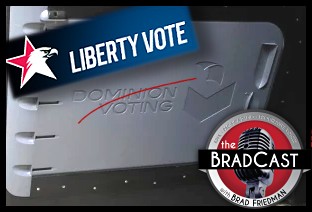 Trump-Allied GOP Partisan Buys Dominion Voting Systems: 'BradCast' 10/22/25
Trump-Allied GOP Partisan Buys Dominion Voting Systems: 'BradCast' 10/22/25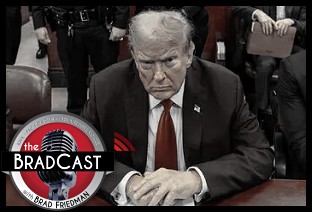 Trump, Republican Law(lessness) & (Dis)Order: 'BradCast' 10/21/25
Trump, Republican Law(lessness) & (Dis)Order: 'BradCast' 10/21/25 'Green News Report' 10/21/25
'Green News Report' 10/21/25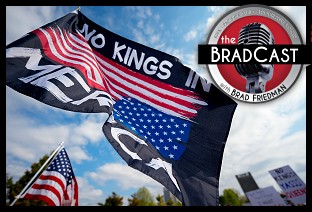 Celebrating 'No Kings': 'BradCast' 10/20/25
Celebrating 'No Kings': 'BradCast' 10/20/25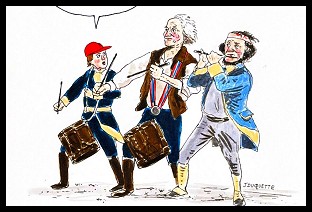 Sunday 'How It Started' Toons
Sunday 'How It Started' Toons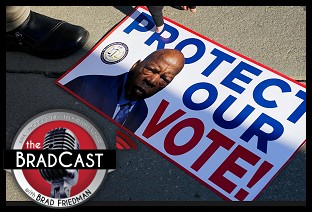 SCOTUS Repubs Appear Ready to Gut Rest of Voting Rights Act: 'BradCast' 10/16/25
SCOTUS Repubs Appear Ready to Gut Rest of Voting Rights Act: 'BradCast' 10/16/25 'Green News Report' 10/16/25
'Green News Report' 10/16/25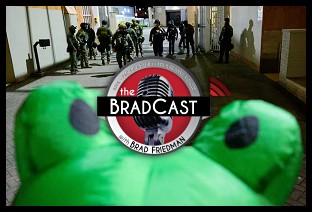 The 'Epstein Shutdown' and Other Autocratic Nightmares: 'BradCast' 10/15/25
The 'Epstein Shutdown' and Other Autocratic Nightmares: 'BradCast' 10/15/25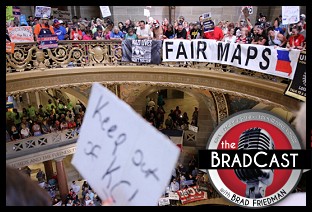 Group Vows to Block MO's GOP U.S. House Gerrymander: 'BradCast' 10/14/25
Group Vows to Block MO's GOP U.S. House Gerrymander: 'BradCast' 10/14/25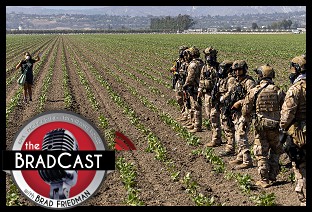 Trump Labor Dept. Warns Trump Policies Sparking Food Crisis: 'BradCast' 10/9/25
Trump Labor Dept. Warns Trump Policies Sparking Food Crisis: 'BradCast' 10/9/25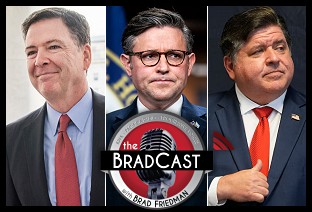 Trump's Losing Battles: 'BradCast' 10/8/25
Trump's Losing Battles: 'BradCast' 10/8/25 Trump, Roberts and His Stacked, Packed and Captured SCOTUS: 'BradCast' 10/7/25
Trump, Roberts and His Stacked, Packed and Captured SCOTUS: 'BradCast' 10/7/25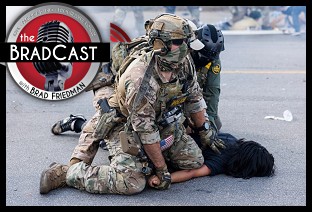 Trump Attempting His 'Invasion from Within': 'BradCast' 10/6/25
Trump Attempting His 'Invasion from Within': 'BradCast' 10/6/25 Biden Budget Expert: Mass Firings in Shutdown 'Illegal': 'BradCast' 10/2/25
Biden Budget Expert: Mass Firings in Shutdown 'Illegal': 'BradCast' 10/2/25 Why is DOJ Suing 'Blue' States for Their Voter Databases?: 'BradCast' 10/1/25
Why is DOJ Suing 'Blue' States for Their Voter Databases?: 'BradCast' 10/1/25
 VA GOP VOTER REG FRAUDSTER OFF HOOK
VA GOP VOTER REG FRAUDSTER OFF HOOK Criminal GOP Voter Registration Fraud Probe Expanding in VA
Criminal GOP Voter Registration Fraud Probe Expanding in VA DOJ PROBE SOUGHT AFTER VA ARREST
DOJ PROBE SOUGHT AFTER VA ARREST Arrest in VA: GOP Voter Reg Scandal Widens
Arrest in VA: GOP Voter Reg Scandal Widens ALL TOGETHER: ROVE, SPROUL, KOCHS, RNC
ALL TOGETHER: ROVE, SPROUL, KOCHS, RNC LATimes: RNC's 'Fired' Sproul Working for Repubs in 'as Many as 30 States'
LATimes: RNC's 'Fired' Sproul Working for Repubs in 'as Many as 30 States' 'Fired' Sproul Group 'Cloned', Still Working for Republicans in At Least 10 States
'Fired' Sproul Group 'Cloned', Still Working for Republicans in At Least 10 States FINALLY: FOX ON GOP REG FRAUD SCANDAL
FINALLY: FOX ON GOP REG FRAUD SCANDAL COLORADO FOLLOWS FLORIDA WITH GOP CRIMINAL INVESTIGATION
COLORADO FOLLOWS FLORIDA WITH GOP CRIMINAL INVESTIGATION CRIMINAL PROBE LAUNCHED INTO GOP VOTER REGISTRATION FRAUD SCANDAL IN FL
CRIMINAL PROBE LAUNCHED INTO GOP VOTER REGISTRATION FRAUD SCANDAL IN FL Brad Breaks PA Photo ID & GOP Registration Fraud Scandal News on Hartmann TV
Brad Breaks PA Photo ID & GOP Registration Fraud Scandal News on Hartmann TV  CAUGHT ON TAPE: COORDINATED NATIONWIDE GOP VOTER REG SCAM
CAUGHT ON TAPE: COORDINATED NATIONWIDE GOP VOTER REG SCAM CRIMINAL ELECTION FRAUD COMPLAINT FILED AGAINST GOP 'FRAUD' FIRM
CRIMINAL ELECTION FRAUD COMPLAINT FILED AGAINST GOP 'FRAUD' FIRM RICK SCOTT GETS ROLLED IN GOP REGISTRATION FRAUD SCANDAL
RICK SCOTT GETS ROLLED IN GOP REGISTRATION FRAUD SCANDAL VIDEO: Brad Breaks GOP Reg Fraud Scandal on Hartmann TV
VIDEO: Brad Breaks GOP Reg Fraud Scandal on Hartmann TV RNC FIRES NATIONAL VOTER REGISTRATION FIRM FOR FRAUD
RNC FIRES NATIONAL VOTER REGISTRATION FIRM FOR FRAUD EXCLUSIVE: Intvw w/ FL Official Who First Discovered GOP Reg Fraud
EXCLUSIVE: Intvw w/ FL Official Who First Discovered GOP Reg Fraud GOP REGISTRATION FRAUD FOUND IN FL
GOP REGISTRATION FRAUD FOUND IN FL

































